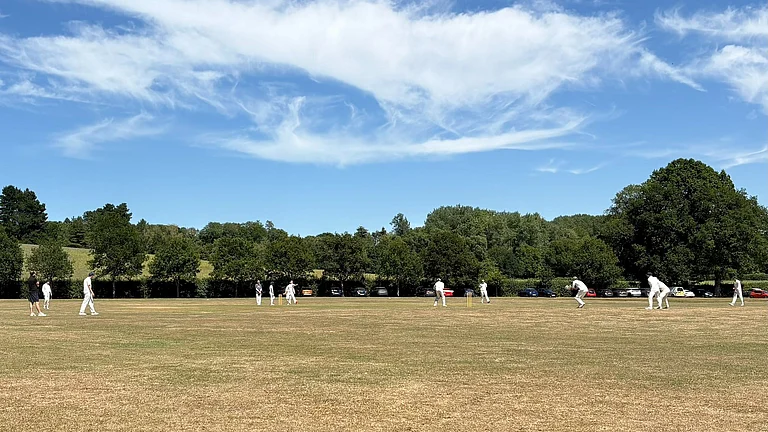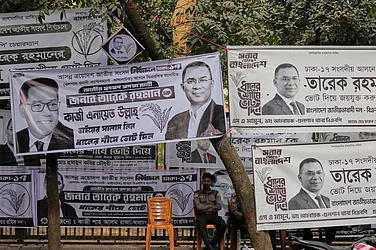“As you attack, it will be our faces you see, not our backs.”- Volodymyr Zelenskyy in an interview to BBC.
Ukraine’s President Volodymyr Zelenskyy has become a household name amid the ongoing Russian offensive on the erstwhile picturesque villages and modern, industrial cities of the nation. While Russia’s invasion of Ukraine has left the whole world shocked, the apparent grit and social media-savvy personality of Zelenskyy, a former comedian who came to power in 2019, has not only given hope to Ukrainians but also set a new standard of sorts for world leaders.
The 44-year-old Zelenskyy first rose to fame as an actor, satirist and comedian with his television show ‘Servant of the People in which he rather prophetically played the President of Ukraine. Later, a party by the same name emerged under the leadership of Zelenskyy which contested the 2019 Ukraine elections and won.
Armed with a degree in law, Zelenskyy grew up in a Russian-speaking town named Kryvyi Rih in southeastern Ukraine and is no stranger to both Russian culture and history of political aggression with former Soviet states like Ukraine. His show ‘Servants of the Nation’ aired just a year after Russia tried to annexe Crimea in 2015 and fed separatism in the region. Not unlike the television show - in which Zelenskyy played a teacher who became Ukraine’s President after his rant video went viral - the Ukrainian President is earning praise for his show of courage in the face of belligerent warmongering.
On Monday, Zelenskyy sough EU candidacy for his country. He has also given rousing speeches against the Russian invasion and the courage of ordinary Ukrainians whom he hailed as ‘heroes’ and ‘warriors’. Clips from his past and present speeches as well as from his TV and comedy performances have been widely shared. In fact, the first episode of ‘Servant of the People’ has seen a mercurial rise in viewership since tensions between Russia and Ukraine simmered.
Zelenskyy’s succinct anti-war rhetoric, which has resonated with the world, especially the youth of Ukraine and other nations, and his straightforward mass appeal has won Ukraine several battles on the diplomatic front. One of the most influential changes in policy came on Saturday with Germany reversing its historic decision to not provide arms to conflict zones. Acknowledging the Russian threat and the attack as an “epochal” moment in Europe’s post-World War II history, German Chancellor Olaf Scholz said in a statement that the Russian invasion of Ukraine marked a “turning point” and threatened the “entire post-war order” of the region. “In this situation, it is our duty to do our utmost to support Ukraine in defending itself against Vladimir Putin’s invading army. Germany stands closely by Ukraine’s side,” the statement said.
In yet another significant move by the German government, steps were taken to halt the process of certifying the Nord Stream 2 gas pipeline from Russia as part of punitive measures against Moscow over the Ukraine crisis.
In the last few days, much of his social media posts and addresses have grabbed eyeballs. Be it his dashing turning down of an apparent US offer to evacuate him from besieged Kyiv (“The fight is here. We want ammunition. Not a ride”, read his Insta post), to his selfie video from the streets of Kyiv amid Russian shelling, the message is strong and clear - Zelenskyy is here to stay. Though a comedian from age 17, Zelenskyy’s zeal for politics and socialism goes back to the time of World War II when his grandfather served as a member of the Soviet Red Brigade. Having lost his ancestors to the Holocaust, Russia’s ‘Neo Nazi’ comments targeted against Zelenskyy have failed to land.
His recent speeches seem also to have wiped away the corruption smears Zelenskyy has faced since coming to office. His name appeared in the infamous Pandora Papers and his production company Kvartal95 which formed the base of Zelenksyy’s political party and campaign has also been linked with dubious finances for setting up of a network of offshore accounts back in 2012. In fact, Zelenskyy had once been dubbed “Ukraine’s Donald Trump” owing to his links with the TV industry much like former US President and media tycoon Donald Trump. The Ukraine President had previously been in news for reportedly being pressured by Trump for compromising material related to current US President Joe Biden’s son. Zelenksyy’s public image today, nevertheless, is a polar opposite of Trump’s and Ukrainians seem not to care about these scuffs on Zelenskyy’s shiny plaque.
Not one to shy away from cameras, Zelenskyy has publicly called out Russia’s aggression while putting forth Ukraine’s (and his own) stance on war. “We know for sure that we don’t need the war. Not a Cold War, not a hot war. Not a hybrid one. But if we’ll be attacked by the [enemy] troops, if they try to take our country away from us, our freedom, our lives, the lives of our children, we will defend ourselves. Not attack, but defend ourselves. And when you will be attacking us, you will see our faces, not our backs, but our faces”. At a time when trigger-happy world leaders are professing jingoism in the guise of national interest and ‘saving democracy’, the former comedian’s words might sound refreshing. The powerful speech brought tears to a Ukrainian translator's eyes and videos of her choking up in the middle of covering the address for German news organisation WeltTV have since gone viral.
Perhaps that explains why Zelenskyy’s approval rating went up to 91 per cent following the invasion. The President’s hold on the popular imagination of Ukrainians was evident in the successful, almost entirely virtual poll campaign led by Zelenskyy’s party from December 2018 onward which ultimately led to the unseating of former Ukraine President Petro Poroshenko. In an interview with Der Spiegel in 2019, Zelenskyy had said that he wanted to join politics to be “professional, decent people to power”. He had also promised that he will not run for a second Presidential term.
But even if he does not remain President, his role in opening up discussions about an open-door approach to refugees coming out of war zones may go a long way in influencing public and foreign policy with regard to war-torn nations. With his staid defence of Ukraine at a time when Russia’s accession policies are at its fore, Zelenskyy is likely to go down in history as a model for a new kind of mass leader - one who does not depend on politics but on mass support and validation earned independently by working for the people and on issues that matter to people.
But now comes the challenging part. With Zelesnkyy agreeing to talks with Russia at the Belarus border, critics have already started calling it a sign of Ukraine’s weakening military might in the wake of a Russian nuclear threat. There have been rumours of Zelenskyy telling Ukrainian troops to stand down, something that Zelenskyy has since denied. An unconventional leader who won because of his TV show and witty, political commentary, the comedian-turned-President today faces the challenge of leading a country at war-time when faced with a traditional enemy. Zelenskyy’s own campaign was heavily focused on bringing Kyiv out of Moscow’s shadow and ushering a new era of Ukrainian politics that reflected the mixture of Russian and Ukrainian sensibilities (much like Zelensky’s own identity). The President will now have to navigate the slippery slope of peace talks — on the one hand, the 44-year-old must cope with the pressure of standing up to Russian bullying. One the other, he must ensure to avoid war at all costs. With a strength of 9,00,000 active troops, the Russian military prowess dwarfs Ukraine which has the 22nd largest military in the world with 196,600 active troops. Any reluctance of inability to broker a deal with Vladimir Putin (that leads to full-scale war) might be read as his inability to defend Ukraine from the economic and physical ruin that a war with Russia will definitely bring. The President will also have to watch out for rebel, pro-Kremlin leaders in Ukraine itself who have reportedly asked Russia for arms to fight the powers in Kyiv.
Will Zelenskyy survive and emerge as one of the influential leaders of the ‘new world order’ post-WW II that is being touted in the media? The next few days will be crucial to finding the answer to that question.


























